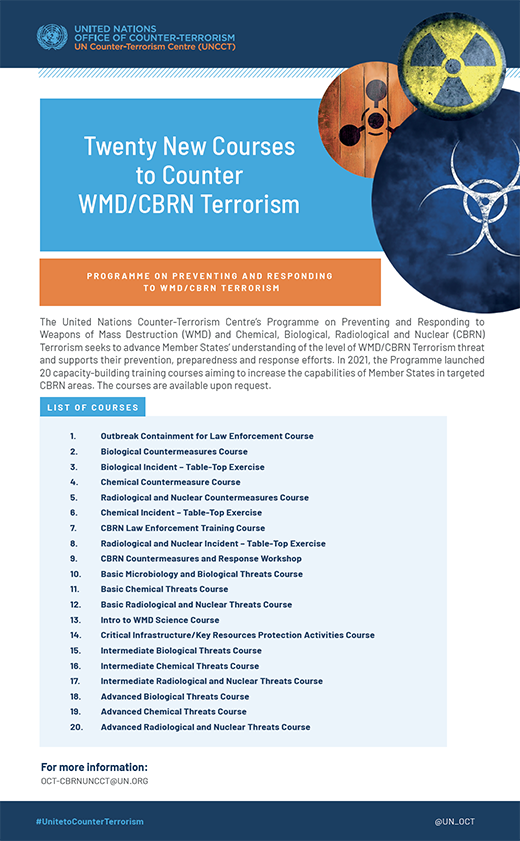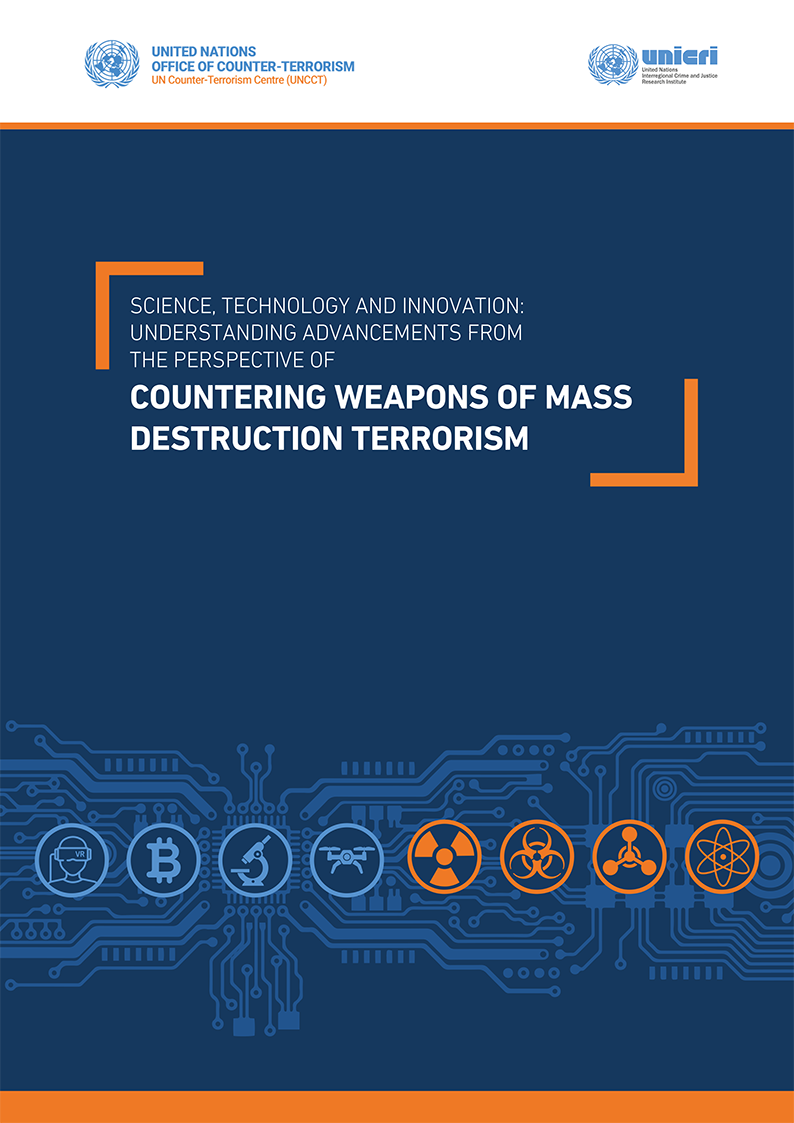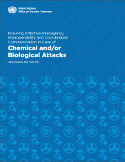Chemical biological, radiological and nuclear terrorism
"The prospect of non-State actors, including terrorist groups and their supporters, gaining access to and using weapons and materials of mass destruction is a serious threat to international peace and security."
-- Under-Secretary-General Vladimir Voronkov in the foreword of UNOCT’s publication Ensuring Effective Interagency Interoperability and Coordinated Communication in Case of Chemical and/or Biological Attacks.
Radiological and Nuclear Threat – Illicit Trafficking
Could terrorists prepare a ‘dirty bomb’ technically known as radiological dispersal device (RDD) to carry out a terrorist attack? UNCCT and the Global Initiative to Combat Nuclear Terrorism (GICNT) are working together to support Member States to counter the threat.
Biological Threat – Misuse of Biotechnology
Could biotechnology be misused to produce new strains of viruses with the intention of perpetrating terrorist attacks? UNCCT, UNICRI and the UN Global Counter-Terrorism Coordination Compact are investing efforts to understand this threat and how technology could be used as a solution.
Chemical Threat – Clandestine Laboratories
How can Member States prevent, interdict and investigate terrorist chemical laboratories? UNCCT and the Department of State of the United States of America are supporting Iraq in these efforts through virtual reality trainings.
Access to weapons of mass destruction
The prospect of non-state actors, including terrorists and their supporters, gaining access to and using Weapons of Mass Destruction (WMD)/Chemical Biological, Radiological and Nuclear (CBRN) materials is a serious threat to international peace and security. Over the years, terrorist groups have tested new ways and means to acquire and use more dangerous weapons to maximize damage and incite terror, including weapons incorporating CBRN materials. With advancements being made in technology and the expansion of legal and illegal commercial channels, including on the dark web, some of these weapons have become increasingly accessible.
Mandate of the Programme
The Security Council has specifically addressed the threat of WMD/CBRN terrorism on a number of occasions. In resolution 1373 (2001), the Council recognized the connection between international terrorism and, inter alia, the illegal movement of CBRN materials. Its seminal pronouncement on the issue came in the form of resolution 1540 (2004), through which the Security Council affirmed that the proliferation of CBRN weapons and their means of delivery constitutes a threat to international peace and security. More recently, the Security Council again called on Member States in resolution 2325 (2016) to strengthen their national anti-proliferation regimes in the implementation of resolution 1540 (2004).
The UN Global Counter-Terrorism Strategy calls upon the Member States, International Organizations and the UN System to:
- Combat smuggling of CBRN materials
- Ensure that advances in biotechnology are not used for terrorist purposes
- Improve border and customs controls to prevent and detect illicit trafficking of CBRN weapons and materials
- Improve coordination in planning a response to a terrorist attack using CBRN weapons or materials
In the Sixth Review of the UN Global Counter-Terrorism Strategy, the General Assembly called upon all Member States to “prevent terrorists from acquiring weapons of mass destruction and their means of delivery… and [encouraged] cooperation among and between Member States and relevant regional and International Organizations for strengthening national capacities in this regard.”
Programme's activities
UNCCT’s Programme on Preventing and Responding to WMD/CBRN Terrorism seeks to advance Member States’ and International Organizations understanding of the level of this threat. It also supports their prevention, preparedness and response efforts at their request.
Through its Programme, the Centre seeks to strengthen partnerships to contribute to existing capacity-building efforts of the international community. UNCCT also provides capacity-building support, focusing on areas such as border and export control, strategic trade control, illicit trafficking, protection of CBRN materials and critical infrastructure, incident response and crisis management, and CBRN forensics, among others.
From 2018 to 2020, seven pilot projects have been developed under the Programme:
- Enhancing national capabilities to prevent and respond to chemical and biological terrorist attacks in Iraq. The project jointly implemented with the United States Department of State focuses on biological and chemical security, investigation, intelligence-sharing, security culture in academia and CBRN response. [Nov 2019 - Jan 2022]
- Enhancing capabilities to prepare for and respond to CBRN terrorist attack in Jordan. The project includes the identification of Jordan’s needs through self-assessment; the delivery of a training course; the organization of a field and virtual reality exercise and the issuance of recommendations. It is jointly implemented with the North Atlantic Treaty Organization (NATO) in close coordination with the Jordanian authorities. [Oct 2018 - Sep 2022]
- Promoting universalization and effective implementation of the International Convention for the Suppression of Acts of Nuclear Terrorism (ICSANT). The project, jointly implemented with the United Nations Office on Drugs and Crime (UNODC) and financially supported by the European Union, includes high-level awareness raising activities, trainings for law enforcement, prosecutors and border/customs officials, legislative assistance, and a study on the causes of lack of adherence to the Convention. [Jan 2019 - Dec 2021]
- Enhancing knowledge about advances in science and technology to combat WMD terrorism. This project, implemented within the framework of the Global Counter-Terrorism Coordination Compact Working Group on Emerging Threats and Critical Infrastructure Protection in cooperation with the United Nations Interregional Crime and Justice Research Institute (UNICRI), analyses how advances in science and technology could augment or enhance terrorist capabilities to acquire and/or deploy WMD. [Mar 2019 – Oct 2020]
- Addressing the Terrorism-Arms-Crime Nexus: Preventing and Combatting the Illicit Trafficking of Small-Arms and Light Weapons (SALW) and their Illicit Supply to Terrorist - in Central Asia. The project jointly implemented with UNODC in cooperation with the Counter-Terrorism Directorate (CTED) and the United Nations Office on Disarmament Affairs (UNODA), contributes to the enhancement of national legislative, strategic and operational capacities of the target countries to properly prevent, detect and counter the firearms trafficking and consequently the associated activities of terrorism and organized crime, through a series of national trainings and workshops as well as regional conferences and needs and legislative assessments. [Jan 2020 – Oct 2021]
- Ensuring Effective Inter-Agency Interoperability and Coordinated Communication in case of Chemical and/or Biological Attacks - Phase III (Implementation). This project, implemented within the framework of the Global Counter-Terrorism Coordination Compact Working Group on Emerging Threats and Critical Infrastructure Protection in cooperation with the Organisation for the Prohibition of Chemical Weapons (OPCW), aims to improve the interagency preparedness and response of international agencies across the humanitarian, health, and security sectors to support Member States request for assistance, relief operations, and victim support as a result of a chemical and/or biological weapons attack. [18 months – to be launched soon]
- Developing Technical guidelines to facilitate the implementation of Security Council resolution 2370 (2017) and subsequent relevant resolutions, preventing terrorists from acquiring small arms and light weapons (SALW), improvised explosive device (IED) components and unmanned aircraft systems (UAS) and components. The project is implemented jointly by CTED, UNIDIR and UNOCT/UNCCT, within the framework of the Global Counter-Terrorism Coordination Compact Working Group on Border Management and Law Enforcement relating to Counter-Terrorism. The project aims to identify key elements of how to comprehensively address existing challenges in the implementation of resolution 2370 (2017) and to contribute to Member States’ capacity to prevent terrorists from acquiring weapons by developing Guidelines to facilitate the resolution implementation. [12 March 2020-March 2021]
In 2021, the Programme will launch a series of training courses with global outreach.
Programme's coordination role
UNCCT’s WMD/CBRN Programme supports the Global Counter-Terrorism Coordination Compact Working Groups on Emerging Threats and Critical Infrastructure Protection and on Border Management and Law Enforcement. Moreover, the Programme strengthens strategic partnerships with relevant WMD/CBRN-related members of the UN Global Counter-Terrorism Coordination Compact and Member States’ International Initiatives, enabling the development of joint, complementary and mutually reinforcing projects. In particular, the Programme has been working closely with the Global Initiative to Combat Nuclear Terrorism (GICNT) and the Group of Seven Global Partnership Against the Spread of Weapons and Materials of Mass Destruction (GP).
Programme's impact
Examples of UNCCT’s WMD/CBRN Programme impact include:
- Member States implement enhanced policies, practices, procedures for the prevention, preparedness and response to WMD/CBRN terrorism and operate with improved awareness, knowledge and understanding of the threat and risk.
- Member States have an enhanced capacity to prevent terrorists from acquiring small arms and light weapons.
- International Organizations and UN entities support Member States in the prevention, preparedness and response to WMD/CBRN terrorism as well as in the prevention of the illicit supply of weapons to terrorists in a more informed and coordinated manner, reflecting the “All-of-UN” approach.
Preventing Terrorists from Acquiring Weapons – Technical Guidelines
These technical guidelines are a first in its kind document to facilitate the implementation of Security Council resolution 2370 (2017) on preventing terrorists from acquiring weapons. They are developed by CTED, UNCCT, UNIDIR and the members of the United Nations Global Counter-Terrorism Coordination Compact Working Group on Border Management and Law Enforcement relating to Counter-Terrorism as a result of a joint project.
This publication is available in: EN





